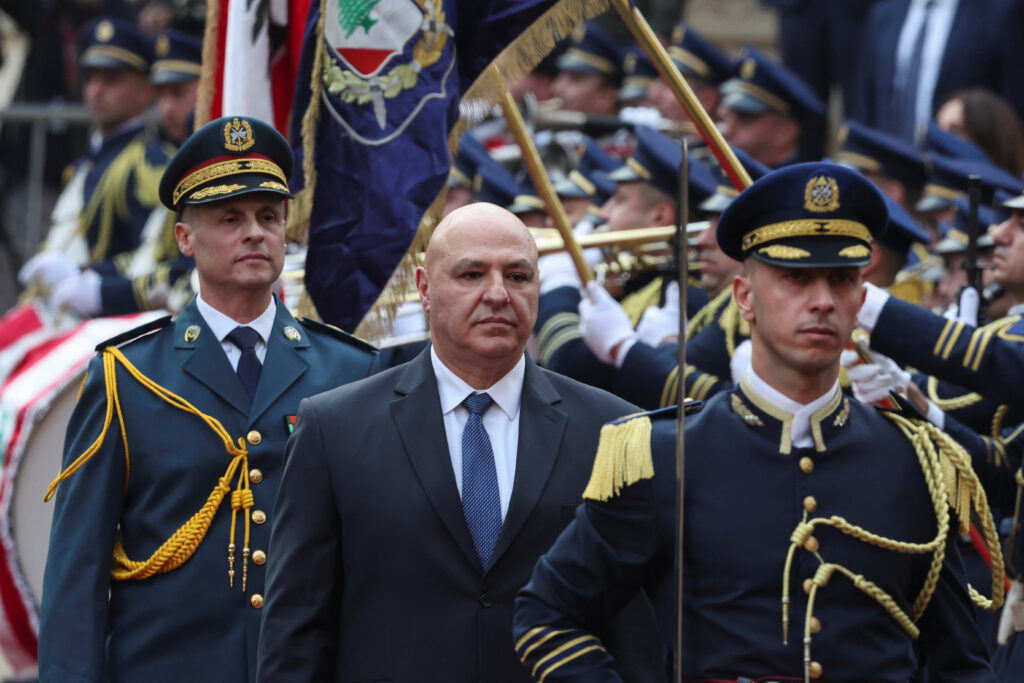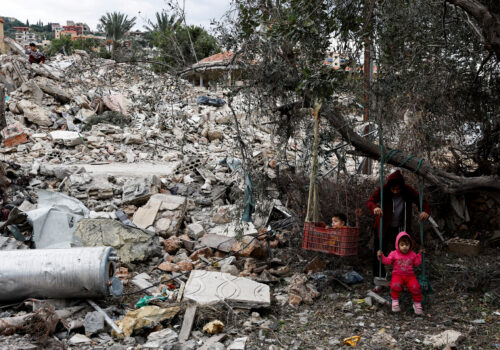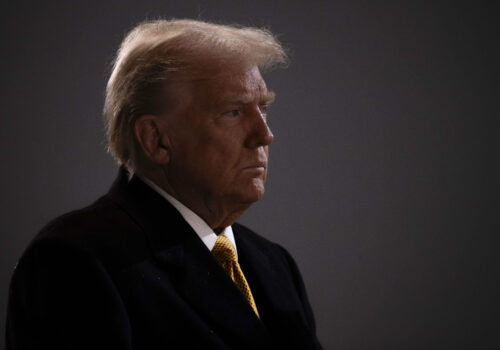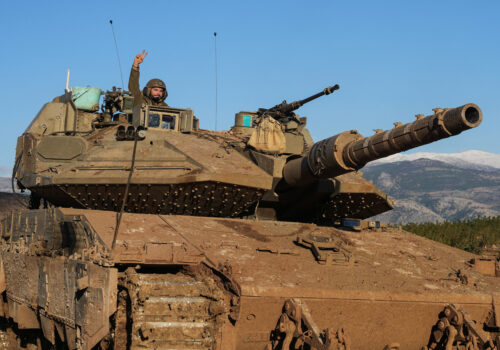Ending a presidential vacuum that had lasted almost two and a half years, Lebanon’s 128-seat parliament today elected General Joseph Aoun, the commander of the Lebanese Armed Forces (LAF), as the tiny Mediterranean country’s new president.
Aoun takes office at a time when Lebanon is grappling with a host of crises. The economy, which crashed dramatically in October 2019, has shown little sign of revival as Lebanon’s political bosses have consistently failed to usher in the necessary reforms that would unlock international financial aid. Since the previous president, Michel Aoun (no relation to Joseph Aoun) stepped down at the end of his six-year term in October 2022, the government has been operating in a limited caretaker capacity, unable to enact critical legislation. Lebanon is also reeling from the aftermath of a devastating war between Hezbollah and Israel. Lebanese officials report that more than 3,800 people have been killed, and the real number could be much higher. Other sources claim that just among Hezbollah members the death toll over the past year is as high as four thousand. An initial assessment by the World Bank estimates that the war caused at least $8.5 billion worth of damage.
Israeli troops are still deployed in the southern Lebanon border district, more than midway through a fragile sixty-day ceasefire that ends January 27. Israeli forces continue to stage air strikes and dynamite swathes of border villages and any Hezbollah military infrastructure they find in apparent daily breaches of the ceasefire agreement. There is no guarantee that the Israelis will have left Lebanon by the time the ceasefire ends, which is why US mediators reportedly have been seeking to extend the deal.
Hezbollah, no doubt, will be sharply watching the new president’s moves in the coming months.
The new president had been the frontrunner to assume the office of Lebanese head of state since Parliamentary Speaker Nabih Berri on November 28, a day after the ceasefire took effect, called for an election session on January 9. However, Aoun’s accession to the country’s top post only hardened in the final twenty-four hours. Suleiman Frangieh—head of the Marada Movement, grandson of a former president, and Hezbollah’s pick for the position—bowed out of the race on January 8, declaring that he would throw his support behind the army commander.
There followed a flurry of declarations from members of parliament that they, too, would vote for Aoun. Parliament held two rounds of voting. In the first round, Aoun secured seventy-one votes, fifteen short of the necessary two-thirds majority. Usually in a second round, a simple majority suffices to win election. However, Berri said that Aoun, as a serving civil servant and therefore constitutionally ineligible to run, would have to obtain more than two-thirds in the second round. Ultimately, he secured ninety-nine votes, helped in part by Hezbollah, which had abstained in the first round as a “message,” according to top party official Mohammed Raad, before endorsing Aoun in the second ballot.
The burly, shaven-headed Aoun is a popular figure in Lebanon, having helmed the LAF through the country’s recent turmoil. Five months after he was appointed army commander in March 2017, the LAF fought a major battle against the Islamic State, which for the previous three years had been entrenched in the desolate mountains of northeast Lebanon, next to the border with Syria. The LAF routed the Islamic State in just over a week.
During the mass protests that followed the economic collapse in October 2019, Aoun defied the orders of the then president and other top politicians to have the LAF drive the protestors off the streets. Aoun, instead, allowed the demonstrations to proceed so long as they remained under control. His even-handedness won plaudits from many Lebanese. He has also managed to hold the LAF together as a coherent entity despite massive inflation, which has resulted in the salaries of soldiers dwindling to almost nothing, triggering some desertions and absenteeism. Fluent in French and English, in addition to his native Arabic, Aoun has won many friends internationally. This is particularly true in the United States and the United Kingdom, with both countries providing years of financial support and training for the LAF.
However, his closeness to Washington has drawn criticism from some Hezbollah-related media outlets, which view the LAF’s warm ties to the United States and the US military with suspicion. Nevertheless, Aoun has been able to navigate the extremely complex relations between the LAF and Hezbollah over the years. The LAF has been criticized in some quarters for failing to actively disarm Hezbollah in line with United Nations Security Council resolutions. However, the LAF is only the implementing arm of state policy. So far, no Lebanese government has instructed the LAF to move against Hezbollah, as it is widely understood in Lebanon that such a step could trigger a civil war.
Hezbollah is not an entity separate from the rest of Lebanon that can be isolated and neutralized. It is deeply interwoven into the country’s social and political fabric. Instead, given that the LAF and Hezbollah are essentially two armies squeezed into a relatively small geographical space, they have learned to live with each other, sometimes uncomfortably, in what is often described locally as a process of case-by-case, interest-based deconfliction.
In his inaugural address, minutes after being elected and sworn in, Aoun pledged that he would call for “quick parliamentary consultations” to hasten the formation of a new government. He also said that there was now a historic opportunity to launch a serious dialogue with Syria’s new rulers to address outstanding issues, such as the delineation of their joint border and a resolution to the fate of Syrian refugees in Lebanon.
Tellingly, Aoun also promised that Lebanon would follow a path of “positive neutrality” and that he would work to “confirm the state’s right to monopolize the carrying of weapons.” These comments echo the conditions of the ceasefire agreement between Hezbollah and Israel. As such, they should go down well in Washington. Hezbollah, no doubt, will be sharply watching the new president’s moves in the coming months. But Aoun is a pragmatist and is unlikely to provoke a confrontation with Hezbollah that, despite receiving a battering in the recent war, remains domestically powerful and potentially dangerous if it feels threatened.
For now, Lebanon can breathe a sigh of relief that the presidential void has been filled by a capable figure. But the new president takes office amid daunting challenges, among which the fate of Hezbollah’s weapons is certainly prominent but not the only one.
Nicholas Blanford is a nonresident senior fellow with the Atlantic Council’s Middle East Programs.
Further reading
Thu, Dec 5, 2024
A ceasefire happened in Lebanon, but Israel seems to have missed the memo
MENASource By Nicholas Blanford
Within hours of the 4 a.m. ceasefire coming into force, Israeli troops inside Lebanon opened fire at vehicles as tens of thousands of Lebanese who had earlier fled the fighting attempted to return to their homes.
Wed, Dec 18, 2024
The stage is set for Trump’s global leadership moment
Inflection Points By Frederick Kempe
The lightning-like fall of the Assad regime in Syria reveals larger weaknesses in Russia and Iran. These weaknesses present the incoming president with three historic opportunities.
Tue, Nov 26, 2024
Experts react: Israel and Lebanon have struck a ceasefire deal. Is the Israel-Hezbollah war really over?
New Atlanticist By
Atlantic Council experts share their insights on the deal, which US President Joe Biden announced on Tuesday and already faces questions about its durability.
Image: Lebanon's army chief Joseph Aoun walks after being elected as the country's President at the parliament building in Beirut, Lebanon, January 9, 2025. REUTERS/Mohamed Azakir



